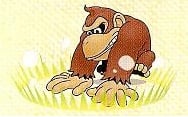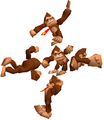Donkey Kong (SSB): Difference between revisions
Mariogeek2 (talk | contribs) m (→Moveset) Tag: Mobile edit |
|||
| Line 21: | Line 21: | ||
==Attributes== | ==Attributes== | ||
[[File:SSB64 Congratulations DK.png|thumb|250px|Donkey Kong's | [[File:SSB64 Congratulations DK.png|thumb|250px|Donkey Kong's [[congratulations screen]].]] | ||
[[File:Ssb64donkeykong.jpg|thumb|Donkey Kong using Hand Slap in the ''SSB'' instruction booklet.]] | [[File:Ssb64donkeykong.jpg|thumb|Donkey Kong using Hand Slap in the ''SSB'' instruction booklet.]] | ||
Donkey Kong is the [[weight|heaviest]] and largest character in ''Super Smash Bros.'' This means he gets hit quite easily, and he also has a poor [[shield]] game, making him vulnerable to [[shield break]] combos such as {{SSB|Yoshi}}'s Z-canceled [[DJC]] neutral aerial performed repeatedly. However, he can take many hits and high [[damage]] before being [[KO]]'d. Like heavyweight characters in subsequent games, Donkey Kong has attacks that deal lots of damage and have strong [[knockback]]. He also has two [[meteor smash]]es (forward and down aerials), and some extremely powerful finishers, including his forward smash and Giant Punch when fully charged or close to fully charged. However, his attacks are generally slow and laggy, and most of his KOs still require setup. | Donkey Kong is the [[weight|heaviest]] and largest character in ''Super Smash Bros.'' This means he gets hit quite easily, and he also has a poor [[shield]] game, making him vulnerable to [[shield break]] combos such as {{SSB|Yoshi}}'s Z-canceled [[DJC]] neutral aerial performed repeatedly. However, he can take many hits and high [[damage]] before being [[KO]]'d. Like heavyweight characters in subsequent games, Donkey Kong has attacks that deal lots of damage and have strong [[knockback]]. He also has two [[meteor smash]]es (forward and down aerials), and some extremely powerful finishers, including his forward smash and Giant Punch when fully charged or close to fully charged. However, his attacks are generally slow and laggy, and most of his KOs still require setup. | ||
Revision as of 21:29, November 9, 2024
| Donkey Kong in Super Smash Bros. | |
|---|---|
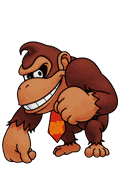 
| |
| Universe | Donkey Kong |
| Other playable appearances | in Melee in Brawl in SSB4 in Ultimate |
| Availability | Starter |
| Tier | C (9) (North America) ? (12) (Japan) |
Donkey Kong (ドンキーコング, Donkey Kong), written as DK, is a starter character in Super Smash Bros. He has slow, yet powerful attacks, like his trademark move: the Giant Punch. Due to this, his archetype has also inspired the archetype for most of the heavyweight characters in subsequent games, in which he has also appeared. His voice clips mostly use gorilla grunts and sounds.
Donkey Kong is currently ranked 9th out of 12 on the tier list. He has powerful moves such as his aforementioned Giant Punch which when fully charged, deals 36% damage. He also sports an infamously abusable grab release, remarkable reach throughout his moveset, and is the heaviest character in the game, making him very difficult to KO, especially vertically. Donkey Kong also benefits from the buffs in international releases thanks to the changes to SDI system as well as the decreased shield stun. However, he is somewhat slow, and is also the largest character in the game, which coupled with his heavy weight makes him an easy target for combos. Despite his incredible endurance, his off-stage survivability is almost non-existent, as his recovery has among the worst vertical distance in the game. In the Japanese tier list, Donkey Kong is ranked 12th, as he does not have the changes from the SDI system and the decreased shield stun, causing him to struggle even more there.
Attributes
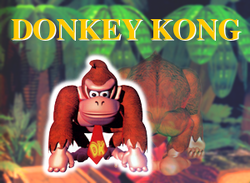
Donkey Kong is the heaviest and largest character in Super Smash Bros. This means he gets hit quite easily, and he also has a poor shield game, making him vulnerable to shield break combos such as Yoshi's Z-canceled DJC neutral aerial performed repeatedly. However, he can take many hits and high damage before being KO'd. Like heavyweight characters in subsequent games, Donkey Kong has attacks that deal lots of damage and have strong knockback. He also has two meteor smashes (forward and down aerials), and some extremely powerful finishers, including his forward smash and Giant Punch when fully charged or close to fully charged. However, his attacks are generally slow and laggy, and most of his KOs still require setup.
Contrary to popular belief, Donkey Kong has slightly above-average dashing speed (although he does have a relatively slow air speed). Donkey Kong has a great grab and throw game due to having the longest non-tether grabbing horizontal range, terrific throw combos (especially when there are walls), and the infamous infinite throw trap that allows him to rack up damage easily and effectively. He also has a KO throw in his back throw. Donkey Kong has good reach, which allows for decent combos despite slow attack speed, but he lacks a projectile and a reliable way to deal with them, making his approach poor and unvaried. His Up B however also breaks projectiles, outside of Fox's laser.
For recovery, Donkey Kong's up special move, Spinning Kong, travels great horizontal distance, but has poor vertical gain, with no options to extend it. This makes him very vulnerable to meteor smashes. It should be noted that Donkey Kong is extremely vulnerable to combos due to being very large, very heavy, and falling somewhat quickly. It is however quite powerful for how fast it is, being a reliable get out of danger move.
In high level play, Donkey Kong is known for his incredible Spinning Kong and back throw gimps. On platforms, it is possible for DK to platform cancel up airs into Giant Punch or up smash. His Up B, Spinning Kong, is an amazing gimping move, with strong knockback as well as being able to out-prioritize every recovery in the game. It also has some invincibility (at the edge of his fists) which makes it quite useful to out-space opponents in the neutral game. Donkey Kong is a hard counter to Jigglypuff, as he can grab, forward throw, cargo release, and re-grab into a Giant Punch for a low percentage KO. With good timing, it is also possible to cancel his Down B after one hit, allowing him to combo into a forward air as well as a fully charged Giant Punch on all characters except for Falcon, Fox, and Yoshi. Donkey Kong however has problems with projectiles, and the top characters in the game (including Pikachu, Kirby, Fox, and Captain Falcon) combo him too heavily for him to rise on the tier list. His poor mobility also gives him a disadvantage against fast characters like Fox and Captain Falcon. Donkey Kong is usually considered to be among the best low tier characters in low tier tournaments due to his Giant Punch combos and the fact that there are not many projectile users in the low tiers (as well as his Up B being able to out-prioritize all of their projectiles.) In short, DK's main strategies in competitive play are gimps using throws, outspacing with Spinning Kong, Down B combos, grab combos into a meteor smash and otherwise, and up aerial chains.
In doubles
Donkey Kong is also considered to be slightly better for doubles than singles, mainly because he is better at KOing as some characters are forced to approach. His great reach also helps. Another good thing is that if he has a fast partner, they will be able to easily save him from large combos. He is one of the few characters with relatively good recovery. Donkey Kong is also excellent at edgeguarding and gimping, especially on Dream Land. However, his problem matchups, especially with Kirby and Pikachu, hinder many doubles matchups.
Difference between game versions
Donkey Kong has been buffed in the NTSC-U version. Donkey Kong is heavier and his Spinning Kong grants more height, improving his endurance and recovery. His back and down aerials are also stronger making it even easier for him to close out stocks. In terms of universal changes, Donkey Kong gets adversely affected by the removal of momentum sliding however, he also benefits from the higher SDI presence, which allows him to escape combos better. As a result of these changes, he is overall better than in the Japanese version.
Attributes
 The removal of momentum sliding slightly hinders Donkey Kong's approach.
The removal of momentum sliding slightly hinders Donkey Kong's approach. Donkey Kong is heavier (0.84 → 0.83).
Donkey Kong is heavier (0.84 → 0.83).
Aerial attacks
 Clean back aerial has increased base knockback (0 → 10).
Clean back aerial has increased base knockback (0 → 10). Down aerial deals more knockback (10 (base), 80 (scaling) → 15/90).
Down aerial deals more knockback (10 (base), 80 (scaling) → 15/90).
Throws
 Opponents require six less button inputs to escape from forward throw.
Opponents require six less button inputs to escape from forward throw.
Special attacks
 Spinning Kong has more vertical lift (676.32 → 809.72).
Spinning Kong has more vertical lift (676.32 → 809.72).
Moveset
For a gallery of Donkey Kong's hitboxes, see here.
| Name | Damage | Description | ||
|---|---|---|---|---|
| Neutral attack | Jab (ジャブ) / Upper (アッパー) | 4% | Donkey Kong performs a jab with the first hit, followed by an uppercut for the second hit. It is one of Donkey Kong's faster ground moves although it is relatively slow for a jab. The first hit can lead into a grab at higher percents although it is unsafe on shield and it fails to lead into the second hit in various situations. The second hit is no stronger than the first hit and it is very laggy, making it very unsafe and not very effective overall.
Jab is overall a situational move for Donkey Kong, with his grab being a far better option overall. | |
| 4% | ||||
| Forward tilt | ↗ | Kong Straight (コングストレート) | 13% | Donkey Kong punches forwards. The move is slow and not particularly powerful either, although it can be angled up or down and it does have long range (although its range doesn't quite match Donkey Kong's hand). It is unsafe on shield but it can be spaced to be made safe. It is overall a very situational move, with a dash grab being the superior option in most situations, although forward tilt can be used to edgeguard in certain situations due to its ability to be angled. |
| → | 12% | |||
| ↘ | 11% | |||
| Up tilt | Spider Web Clearing (くもの巣はらい) | 13% | Donkey Kong swings his hand in an arch above him, with the move having strong vertical knockback. It comes out on frame 4, making it tied with Kirby's up tilt for the fastest in the game in terms of startup. It also has great range above and behind Donkey Kong although its range in front of him is lacking. It is also the strongest up tilt in the game, KOing Mario at 118% on Dream Land.
However, it has a lot of ending lag, having the highest ending lag out of any tilt in the game. The move is not only very punishable on whiff and even on shield but it is also unsafe on hit at lower percents, making it very risky to use. At mid percents, the move does not reliably combo into anything if hit from the front, although Donkey Kong does get followups if it hits from the back. Up tilt is overall a very situational move for Donkey Kong as while it hits hard, it is far too risky to use, and the reward for landing it usually isn't particularly high, especially at lower percents. | |
| Down tilt | Slouch Slap (ロースラップ, Low Slap) | 8% | Donkey Kong performs a quick hand swipe while crouching. It comes out slowly on frame 11 but it has very little ending lag and it has decent range. It can combo into grab at lower percents and at higher percents, it can set up tech chases and edgeguards. It is also very safe on shield, with Donkey Kong having just enough time to get a guaranteed grab on shield from a fresh down tilt.
Down tilt is overall Donkey Kong's most useful tilt due to its low ending lag. | |
| Dash attack | Iron Kick (アイアンキック) | 12% | Donkey Kong sticks his foot out and slowly advances forward before stopping completely. Possibly a reference to the ending of the arcade version of Donkey Kong Jr.. The move launches opponents up and towards Donkey Kong with set knockback. It comes out very quickly on on frame 3 although this is the only positive with the move.
Dash attack has incredibly high ending lag, it covers a short amount of distance and while it technically has a lot of active frames, its hitboxes end before Donkey Kong stops moving, giving it a deceptively short amount of range, especially during the later parts of the animation. These factors make the move difficult to land and incredibly unsafe if it does not connect. It can even be unsafe on hit in some cases, especially if the opponent crouch cancels the move and even when it is safe on hit, it is too laggy to lead into anything (although it can lead into followups if it is interrupted by a weaker attack). It can set up tech chases on Dream Land platforms but even in this case, Donkey Kong might not have a significant enough frame advantage to punish the opponent's tech options. It can also be used to clang with other attacks due to its quick speed but this is overall very risky and not reliable, as a mistimed dash attack can be fatal for Donkey Kong. Dash attack is overall considered to be one of the worst moves in the game, as it is far too laggy, hard to land and the reward for landing it is not high at all, regardless of the opponent's percent. It is a move which is almost never used intentionally at high levels of play. | |
| Forward smash | ↗ | Power Slap (パワースラップ) | 21% | Donkey Kong reels his hand back and thrusts it forward. It comes out very slowly, not coming out until frame 27, which makes it very difficult to land in neutral or as a followup. Forward smash does have good range, damage and knockback however, being one of the strongest forward smashes in the game. It can be angled up or down, with the up angled version being the strongest forward smash in the game (barring Link's forward smash in the European version). Donkey Kong can set up into his forward smash with certain moves and it can be used to edgeguard some characters. It is also very safe on shield, with the up angled version even being able to lead into a guaranteed grab if the opponent is close enough.
Forward smash is overall a situational yet rewarding move for Donkey Kong when used in the right situations. |
| → | 20% | |||
| ↘ | 19% | |||
| Up smash | Jumbo Press (ジャンボプレス) | 21% | Donkey Kong claps directly above him. The move deals 21% and very high vertical knockback, being one of the strongest up smashes in the game. It has a very large hitbox, easily hitting opponents on Dream Land platforms and Donkey Kong's head and arms are intangible while the hitboxes are out, making it a powerful anti-air. Donkey Kong can also combo into it using an up or down aerial for a KO and Donkey Kong can combo into a forward aerial out of it at specific percent ranges.
The move comes out slowly on frame 16 however, it has high ending lag and it has limited horizontal range. It also cannot hit shorter characters on the ground (if they are on the same ground level as Donkey Kong). The move is safe on shield against most characters but it does leave Donkey Kong at a frame disadvantage. Up smash is overall a situational yet powerful move for Donkey Kong when used in the right situations. | |
| Down smash | Ground Roll (グランドロール) | 19% | Donkey Kong performs a 360° spin while doing a split. It deals 19% and high diagonal knockback, having above average KO power for a down smash. It also has a long hitbox duration and hits on both sides of Donkey Kong, making it effective at catching rolls. The move does come out slowly on frame 12 but it is Donkey Kong's fastest smash attack. It also has very high ending lag, which makes it very unsafe and easily punishable. It also has an unfavorable launch angle which makes it ineffective at both edgeguarding and setting up combos, especially when combined with its ending lag.
Down smash is overall a situational move for Donkey Kong as while it has utility in some areas, the move is often too risky for the reward it can give. | |
| Neutral aerial | Donkey Lariat (ドンキーラリアット) | 15% (clean), 12% (late) | Donkey Kong spins around with his arms out. It starts off dealing 15% but after its first four active frames, it deals less damage and knockback. It comes out quickly on frame 4 and it has a somewhat long hitbox duration, making it a decent defensive move. It has above average damage for a neutral aerial although its knockback is below average. It can lead into followups at lower percents but its utility is limited at higher percents and it does not hit below Donkey Kong very well, making him easy to hit from below. It also has high ending lag which can make it quite unsafe to use off stage. | |
| Forward aerial | Hammer Knuckle (ハンマーナックル) | 16% | Donkey Kong does a front flip with his fists clasped together, smashing them into opponents. It is a powerful meteor smash although it does also have strong horizontal knockback if Donkey Kong's arms connect rather than his hand, which naturally makes it a strong edgeguarding tool. This move inspired Donkey Kong's air attack in Donkey Kong 64. It comes out fairly quickly on frame 8 and lasts until frame 16, and while it does have a considerable amount of ending lag, it does have the shortest total duration out of all of Donkey Kong's aerials. The move can easily be used as a combo starter, extender or ender at a wide variety of percent ranges, with Donkey Kong having multiple followups out of the move against grounded opponents and he has multiple ways to combo into it for a KO at fairly low percents. It is Donkey Kong's most damaging aerial which also makes it his safest aerial on shield, giving him slightly more time to punish shielding opponents than his other aerials.
Interestingly, the move has a very long initial auto-cancel window, with the move auto-canceling for the first 19 frames of the animation. As the move's hitboxes are active from frames 8-15, this means that if the player lands while the hitboxes are active, they will auto-cancel, removing the need to Z-cancel. The move will go into its landing lag animation from frames 20-35 of its animation although the move is generally used in situations where it will automatically auto-cancel. This is the only aerial in the entire series where its initial auto-cancel outlasts the hitbox, while still not auto-canceling for the entire animation. Forward aerial is overall a very strong and useful aerial for Donkey Kong due to its speed, arching range, combo and edgeguarding potential. | |
| Back aerial | Kong Rocket (コングロケット) | 15% (clean), 10% (late) | Donkey Kong puts his feet together and thrusts them out behind him, his body moving sideways with them. It deals 15% with the clean hitbox but during its later active frames, it deals 10%. It comes out on frame 8 and the hitboxes are fairly large and have a long duration. It has combo potential at lower percents and is highly effective on shield, but is burdened by considerable ending lag and has below average KO potential for a back aerial, making it one of the less effective back aerials overall. Nevertheless, it is still a solid and useful move overall.
In the Japanese version, back aerial dealt less knockback, having the same power as neutral aerial. This made it a worse KO move but this did also allow it to combo into other moves for longer. | |
| Up aerial | Mid-air Spider Web Clearing (空中くもの巣はらい) | 12% | Donkey Kong swings his hands in an arch, similarly to his up tilt. The move deals 12% and launches opponents up and towards Donkey Kong with below average vertical knockback for an up aerial. It typically cannot KO and has very high ending lag and landing lag, which can make it quite unsafe and punishable (although the landing lag can be mostly eliminated with Z-canceling, which also makes the move very safe on landing). It has extremely low startup on frame 3 however, and it has a long hitbox duration, with the move covering both in front and behind Donkey Kong, in addition to above him. When combined with its weak vertical knockback and Z-canceling, this makes the move a useful juggling tool. It can be awkward to utilize in some situations, but it can be a strong combo tool when used in the right scenarios, with the move being able to lead into itself multiple times as well as Donkey Kong's up smash, forward aerial, and Giant Punch for KOs at certain percentages. | |
| Down aerial | Air Stampede (エアスタンピード) | 13% (clean), 10% (late) | Donkey Kong thrusts his feet down, with the move meteor smashing opponents. It comes out on frame 6 and its hitboxes last for a very long time while retaining its meteor angle for its entire duration, although it does become weaker during its later frames. It is naturally effective for edgeguarding and against grounded opponents, it can lead into many followups, with up smash working in some scenarios for a KO. In scenarios where up smash will not work, forward aerial will typically be strong enough for a KO and Giant Punch is a viable followup at a wide percent range as well. The move does have high ending lag and landing lag however so it can be unsafe to use off stage depending on Donkey Kong's position and the move is very unsafe if Donkey Kong does not Z-cancel the move. Nevertheless, down aerial is a very useful aerial for Donkey Kong if he can land it.
In the Japanese version, down aerial dealt less knockback, which can be beneficial or detrimental depending on when it is used. | |
| Grab | Grab (つかみ) | — | Donkey Kong clenches his hands forwards. Donkey Kong has the longest normal grab range out of any character in the game, with his grab also being just as fast as other characters' grabs. This makes Donkey Kong's grab very easy to land, especially since Donkey Kong has multiple ways to confirm into grab. When combined with his very potent throws, Donkey Kong's grab is one of the best in the game (and one of his most useful tools in general), with its only notably weakness being that Donkey Kong grabs fairly high, which can allow shorter characters to low profile under the grab. | |
| Forward throw | Kong Karry (リフティング, Lifting) | 8% (carry), 8% (throw) | Donkey Kong picks up his opponent and holds them on his back. He can then move around and jump before throwing them forward or backwards, although it is possible for the opponent to mash out of the throw. This throw is based on his ability in Donkey Kong Country to effortlessly carry barrels on his back. After throwing the opponent, Donkey Kong can go for a punish attempt to try and catch the opponent's recovery attempt. If the opponent breaks out of the grab, they receive some knockback and they end up close to Donkey Kong. This can lead into followups/mixups for Donkey Kong, with his most powerful option being another grab to reset the situation. This is not guaranteed at lower percents but it is difficult for some characters to avoid and it does become guaranteed at higher percents. It is overall a unique yet useful throw for Donkey Kong.
In the Japanese version, forward throw required more inputs to break out of, which made it a more useful throw overall. | |
| Back throw | Direct Throw (ダイレクトスロー) | 18% | Donkey Kong turns around and tosses the opponent backwards. The throw is very fast and very strong, dealing very high damage and knockback. It is overall the strongest throw in the game, KOing Mario under 100% from the middle of Dream Land, although some throws are stronger at the ledge. At lower percents, it can put opponents onto one of Dream Land's side platforms for a tech chase scenario and if the opponent ends up off stage, they can end up getting KOed if Donkey Kong successfully edgeguards them. At slightly higher percents, it either sends the opponent very far off stage where Donkey Kong can go for an edgeguard for a KO or it just flat out KOes the opponent. Donkey Kong's back throw is overall one of the best in the game due to its incredible strength and speed. | |
| Forward roll Back roll |
— | — | ||
| Techs | — | — | ||
| Floor attack (front) Floor getups (front) |
6% | Donkey Kong kicks while on his back, forcing his body down, then picks himself up and kicks on the other side. | ||
| Floor attack (back) Floor getups (back) |
6% | Donkey Kong kicks while on his back, forcing his body down, then picks himself up and kicks on the other side. | ||
| Edge attack (fast) Edge getups (fast) |
6% | Donkey Kong hoists himself onto the stage back-first, ramming into opponents. It comes out on frame 9, making it the fastest edge attack in the game by quite a margin and it has long range, making it practical to land. Donkey Kong is also intangible for the first 10 frames of the edge attack, making it impossible to intercept during its startup. The move does whiff against characters close to the edge however and while it does have a decent amount of active frames, its hitboxes do end before Donkey Kong finishes advancing forward, giving it less range than its animation suggests. It also has very high ending lag for a fast edge attack, making it easily punishable.
Donkey Kong's fast edge attack is overall considered to be one of the better edge attacks in the game. | ||
| Edge attack (slow) Edge getups (slow) |
6% | Donkey Kong climbs back onto the stage slowly, slapping opponents in front of him. It comes out very slowly on frame 49, although Donkey Kong is intangible for the move's first 50 frames. It also has high ending lag, low damage and very short range, with the move even whiffing against opponents close to the edge.
In quite a contrast to his fast edge attack, Donkey Kong's slow edge attack is considered to be one of the worst in the game, especially in comparison to his fast edge attack. | ||
| Neutral special | Giant Punch | 14% (uncharged), 36% (fully charged) | When B is pressed, he starts charging up a punch. Pressing Z stores the charge, and it can then be continued by pressing B. The longer the move is charged, the more powerful it is. When fully charged or close to fully charged, it is a very powerful KO move. | |
| Up special | Spinning Kong | 12% (startup), 8% (loop), 3% (final hit) | A recovery move that gains very little vertical recovery height, but gives quite a large amount of horizontal distance. Contains many hits that can do high damage, but it is very difficult to land all the hits. He is invincible for the first 5 frames. Has very high set knockback at the edge of the fists as well as invincibility in the same region which makes it quite useful at gimping. | |
| Down special | Hand Slap | 10% | Delivers an earth-shaking blow to the ground, sending nearby enemies skyward. It has considerable power, consistent and repetitive damage, and a large hitbox. Cannot be used in midair. It is possible to combo this move by only using one hit of it into a giant punch vs. everyone other than Jigglypuff. | |
Announcer call
English/Japanese/Chinese
French
German
On-screen appearance
- Breaks out of a Donkey Kong Country-style DK Barrel.
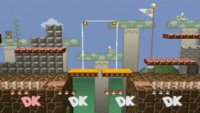
|
|---|
Taunt
- Turns to his right, raises his arms so that his palms are facing upwards, shrugs, and makes a confused growl while shaking his head. Oddly causes his head to become invincible to projectiles (as it turns it on its Z-axis as if it was a roll.)
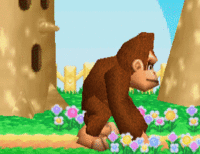
|
|---|
Crowd cheer
| English | Japanese | |
|---|---|---|
| Cheer | ||
| Description | *clap* Donk- *clap* -ey *clap* Kong | Donk-ey Kong |
| Pitch | Crowd Chant | Crowd Chant |
Victory poses
- Holds his hands and shakes them above his head in self-congratulation to the left, then to the right, then forward (reference to when he completes a Bonus Stage or defeats a boss in Donkey Kong Country, only without clapping his hands, and shaking them in front of him first).
- Hops and flexes (also his character selection animation).
- Beats his chest.
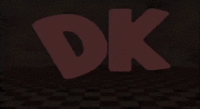 |
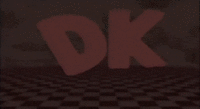 |
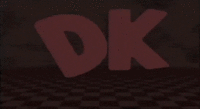
|
|---|
In competitive play
Most historically significant players
- See also: Category:Donkey Kong players (SSB)
Allgreen - A North Carolina player that commonly competed in Japanese tournaments. While he doesn't play Donkey Kong at every tournament, co-maining the character with Kirby, he placed 17th at Super Smash Con 2019, 25th at Kansai 2020, and was considered a hidden boss on the 2019-2020 Smash 64 Power Rankings.
Amasawa - Was one of the best Japanese players in the early meta while maining Donkey Kong, a character considered significantly worse in the Japanese version of Smash 64. He holds wins over Red, Sekirei, and Rinko.
Darkhorse - While he mains Captain Falcon, he has gone solo Donkey Kong at a few events such as 9th at Hitstun 5 and 17th at Keystoned II with wins over Wookiee and Roman. He also used the two characters to place 5th at The Big House 9 and 7th at Shine 2017. Was previously ranked 33rd on the 2019-2020 Smash 64 Power Rankings with Captain Falcon and Donkey Kong being his primary characters listed.
Lorenzo - The best solo Donkey Kong player in South America and one of the best in 2017, being ranked 61st on the 2017 64 League Rankings. In 2017, he placed 7th at Boss Battle 2 which marked the first time a Donkey Kong player made top 8 at a Smash 64 major. He continued to give the character's best solo results with 13th at UFSmash 3 and 17th at Get On My Level 2017, being able to secure wins over Shalaka, Dext3r, and Shears. He has been inactive since early 2019.
tacos - The current best Donkey Kong player in the world, albeit as a secondary at many tournaments. Notably placed 2nd at Get On My Level 2019 and Operation Desert Smash III using Donkey Kong in a few of his sets and beating Josh Brody and Wangera. During 2021-2022, he was ranked 28th on the 2021-2022 Smash 64 Power Rankings as the highest and only player to use Donkey Kong.
Tier placement and history
Donkey Kong has historically been considered a low to lower-middle tier character. His major disadvantages are his large size and lack of speed make him easy to combo, which greatly harms him due to the massive amount of hitstun present. However, he does have a few saving graces in Spinning Kong and back air being good gimping tools as well as having the only true chain grab in the game. Players only tend to use Donkey Kong when their opponent is picking a specific character like Jigglypuff, as Donkey Kong has specific tools to counter them. Donkey Kong performs comparatively in doubles, as his above average K.O. potential pairs well with characters that can rack up damage but have little in the way of closing stocks like Fox and Ness.
In single-player
In the game's single-player mode, the player and two randomly chosen allies will fight a Giant Donkey Kong on Congo Jungle.
Techniques
Infinite throw trap
Donkey Kong has the ability to use his forward throw as a means of nigh-inescapably racking up damage on characters. In order to do this, Donkey Kong must use the forward throw, but not any other throw. If the opponent escapes, they will likely still be within Donkey Kong's grab range whereupon they can be grabbed again. This throw trap can be broken if the opponent can shake towards Donkey Kong and his grab. Yoshi and Ness have the most difficulty escaping the throw trap due to their unique double jumps. Pikachu, Samus, Mario, and Luigi have the least difficulty escaping due to their up specials.
Amasawa Loop
Due to Donkey Kong's laggy aerials, Donkey Kong has very little combo ability with his aerials except a down aerial or forward aerial into a throw. However, if Donkey Kong shield drops from a ledge, he can quickly use an up aerial and then Z-cancel. Donkey Kong can also jump, use an aerial, and Z-cancel on a ledge for a similar effect. As a result, on ledges, Donkey Kong can juggle characters with up aerials whom he would otherwise be unable to combo.
Down special resets and down aerial usage
Donkey Kong can also cancel the first slap of Hand Slap by only pressing B once, enabling him to combo it into a virtually any move to KO the majority of the cast outside of Jigglypuff. It also makes him invincible for the first 2 frames. Donkey Kong's other main KO'ing setup outside of grab-based gimps is a Down Aerial into an Up Smash or a Down Air into a Down Smash.
Description
From the Game
Donkey Kong and Mario started out as arch-rivals, but they've patched things up in recent years. These days DK spends his time searching the jungle for bananas instead of kidnapping beautiful maidens. In the past few years, other members of the Kong family have cashed in on DK's fame as well, including his favorite nephew, Diddy.
Works:
- Donkey Kong (NES)
- Donkey Kong Country (SNES)
- Mario Kart 64 (N64)
Alternate costumes

| ||||
Gallery
Image of Donkey Kong from Smabura-Ken!!.
Trivia
- Donkey Kong is one of four characters, along with Kirby, Mario, and Captain Falcon, in Super Smash Bros. to have a green costume not normally accessible via character select, only being available if Donkey Kong is in on the Green Team in Team Battle.
- Donkey Kong, along with Yoshi, is one of two characters in the original Super Smash Bros. to never be portrayed with headwear in-game.
- Donkey Kong is the only character without a sex kick as his neutral aerial.
- Both Samus and Donkey Kong had their official artworks flipped horizontally on the official English website.
- Donkey Kong is oddly able to avoid projectiles from hitting his head if he taunts at the precise moment.
- This is the only game where Donkey Kong is the heaviest. In future installments, he would be replaced by Bowser.
- This is also the only game in which a protagonist is the heaviest character.
- Not counting Final Smashes and Bosses, the Smash 64 NTSC and PAL iteration of Donkey Kong is the heaviest playable character in the entire franchise, weighing over 140 units (though 64 weight units are listed differently).
- Donkey Kong's portrait on the Character selection screen greatly resembles a piece of official artwork from Donkey Kong Country.
| Fighters in Super Smash Bros. | |
|---|---|
| Fighters | Captain Falcon · Donkey Kong · Fox · Jigglypuff · Kirby · Link · Luigi · Mario · Ness · Pikachu · Samus · Yoshi |
|
| |
|---|---|
| Fighters | Donkey Kong (SSB · SSBM · SSBB · SSB4 · SSBU) · Diddy Kong (SSBB · SSB4 · SSBU) · King K. Rool (SSBU) |
| Assist Trophy | Klaptrap |
| Boss | Giant Donkey Kong |
| Stages | Kongo Jungle · Kongo Falls · Jungle Japes · Rumble Falls · 75m · Jungle Hijinxs |
| Items | Hammer · Barrel Cannon · Peanut · Spring |
| Enemies | Kritter · Tiki Buzz |
| Other | Dixie Kong · DK Barrel · DK Island · Pauline · Zinger |
| Trophies, Stickers and Spirits | Trophies (SSBM · SSBB · SSB4) · Stickers · Spirits |
| Music | Brawl · SSB4 · Ultimate |
| Masterpiece | Donkey Kong |
| Related universe | Mario |
